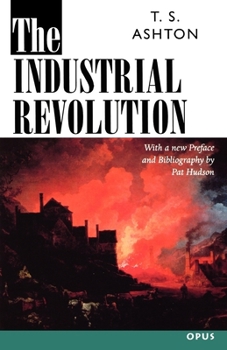The Industrial Revolution, 1760-1830
Select Format
Select Condition 
Book Overview
The Industrial Revolution has sometimes been regarded as a catastrophe which desecrated the English landscape and brought social oppression and appalling physical hardship to the workers. In Ashton's classic account, however, it is presented as an important and beneficial mark of progress. In spite of destructive wars and a rapid growth of population, the material living standards of most of the British people improved, and the technical innovations...
Format:Paperback
Language:English
ISBN:0192892894
ISBN13:9780192892898
Release Date:January 1998
Publisher:Oxford University Press, USA
Length:162 Pages
Weight:0.30 lbs.
Dimensions:0.5" x 5.1" x 7.7"
Customer Reviews
5 ratings
A Short Introduction of a not very interesting subject.
Published by Thriftbooks.com User , 14 years ago
There is not much to say about this great little book. An excellent author, a dedicated scholar, a readable book that summarize an important episode in the social evolution of the world, the industrial revolution, started by no other than the British people. This book can be found in the "Brevarios" serie of the "Fondo de Cultura Economica", which has several interesting books, similar to the Oxford's "Short introductions", but in spanish. "Necessity is the Mother of invention" ... for some countries only.
Great History
Published by Thriftbooks.com User , 14 years ago
If you are looking for a well written and concise history of the Industrial Revolution then this book is for you. It provides a decent overview but little detail or analysis.
Refreshingly clear, non-politically correct economic history
Published by Thriftbooks.com User , 16 years ago
This book is a collection of essays on economic history pertaining to the Industrial Revolution. It is not a politically correct book, often turning traditional accepted beliefs about the industrial revolution on their heads. For example, one of the reasons why many poor families had dingy, windowless dwellings was the window tax charged by the government based on the number of windows in your house. Ventilation and health suffered as a result. Another example is the reason for the shoddy tenements built in the cities experiencing rapid industrial growth. Government rent and building regulations made it awkward to invest capital in housing. As a result, the cities that witnessed the greatest economic growth were often some of the least developed and regulated prior to the Industrial Revolution. In short, this is a well-researched economic history that suggests free markets and property rights as being central to the Industrial Revolution while demonstrating that the government regulations often made things worse for the working poor. If you like this, you'll enjoy books by Burton Folsom, like the Myth of the Robber Barons or Empire Builders.
A solid, no-nonsense book about an important subject
Published by Thriftbooks.com User , 24 years ago
First published in 1948, this book has gone through many editions, the latest, as we can see here, put out in 1998. I recently read the 1964 edition, picked up long ago at a booksale in Melbourne, Australia. Ashton's work is probably timeless. It is a down-to-earth, very well reasoned history of the various historical tendencies and phenomena that together are called "the industrial revolution". I cannot vouch for this volume being absolutely correct. The author does not have much time for those who dwell on the evils of industrialization, or who want to include class struggle in their analysis. Though I was not fully convinced of this, still I was willing to listen. Not being an expert in the field, I was looking for a decent explanation or summary of the whole process. I definitely got my money's worth in Ashton's book. It is well-written, without jargon and without presumption of vast historical knowledge on the part of the reader. It gives you an overview of such various fields as population growth, early forms of industry in England, the technical innovations, capital, banking, labor unions, conditions of workers, industrialists' clubs, and relation of agriculture to industry. Though I found the part about banks and interest rather rough going, it was entirely due to my own poor understanding of the field. My edition could have used a map. The shires, the rivers, and the many towns of England are not all imprinted firmly in the brains of North Americans. Other than that, I would heartily recommend this book to anyone who wants to improve their understanding of the Industrial Revolution.
simply delightful to read as well as a thorough resource
Published by Thriftbooks.com User , 25 years ago
I can't believe I'm the first to write about this. I bought this a few years back while a graduate student in modern European history. My focus was primarily industrialization. This book is a joy. Ashton provides a thorough picture of the Revolution from several perspectives. He describes how events and developments built upon each other and how the innovators fed each others efforts. Most importantly, Ashton is a terrific writer. Other books on this and like topics can be as dry as the Sahara. Ashton is engaging and witty. This is not a book that requires a terrifically large committment. Even if you are not a student but simply interested in the topic, please read this.





